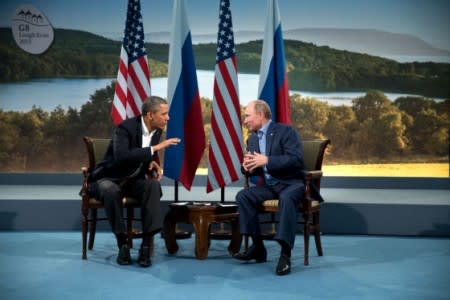Presidential powers questioned as Syria crisis nears end game
As the Syria crisis heads towards an international settlement, the debate about war powers continues at home, with many questioning the constitutional process of extending military force overseas.
Barack Obama and Vladimir Putin
Libertarian Senator Rand Paul is among those in Congress who want a new resolution passed that requires congressional approval for any “military action” taken by a President.
Paul’s language, which he wants at the end of any U.S. Senate resolution, states that, “notwithstanding any other provision of law, the authority to use force resides in Congress, and the President does not have authority to carry out the military action set forth in this resolution absent passage of the resolution.”
The latest development in the Syria situation is an apparent effort within the United National Security Council, with Russia working to obtain Syria’s cooperation, to reach an agreement to impound Syria’s chemical weapon supply.
Once the stockpile is under international control, the U.S. Senate would craft a different resolution.
The website Politico says that a group of powerful Senate leaders, from both sides of the aisle, wants to propose a resolution that would allow UN inspectors to remove the weapons from Syria. If a deadline is passed, and the weapons aren’t removed, the United States would have the right to take military action.
President Barack Obama will address the nation at 9 p.m. tonight, and aside from repeating his threats to use military force, if needed, in a very limited role in Syria, there could also be talk of compromise.
But to many people who study the issues of presidential power and the War Powers Resolution, the President’s decision to consult Congress before the Syria attack is an important moment in the history of the War Powers Resolution, which dates back to 1973.
Back then, the Resolution was passed by lawmakers in the wake of the Vietnam War. Most Presidents since then have said the Resolution was unconstitutional, or they took military action first and then explained it to Congress.
For example, in 2011, President Obama decided to start military action in Libya and then justify his actions to Congress later.
This time, President Obama’s decision to ask for congressional approval before a limited strike on Syria left supporters of presidential power scratching their heads, while those who believe in a congressional oversight role are pondering the President’s timing.
In writing for Constitution Daily, Robert F. Turner from the University of Virginia School of Law told us last week that President Obama clearly has the constitutional power to launch missile strikes at Syria without congressional approval. But he would also benefit from having a congressional consensus before taking military action.
We also noted that Jack Goldsmith, another voice from the right, said on his Lawfare blog that President Obama needed approval from Congress before taking military action, since there wasn’t a self-defense rationale for any strike in Syria, nor a request from the UN or NATO for intervention.
After the Syria crisis fades away, the legacy of the past two weeks will leave scholars pondering two questions.
First, will future Presidents revert to past behaviors and just ignore the War Powers Resolution when pursuing the use of military power overseas, with appropriate justifications?
Or will all future Presidents be handicapped by President Obama’s decision to ask Congress to authorize the very limited use of military force in Syria?
One place where the debate won’t be settled is the Supreme Court. Historically, the Court has avoided the spat between the Executive and Legislative branches.
In 2000, the Court refused to hear, without comment, an appeal from 31 members of Congress that President Bill Clinton took military actions in Yugoslavia without congressional authorization.
Scott Bomboy is the editor-in-chief of the National Constitution Center.
Recent Constitution Daily Stories
Hillary Clinton in elite company as Liberty Medal recipient
Video: Ginsburg explains Stone as inspiration for Fisher dissent


